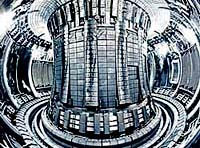South Korea on Friday began operating a nuclear fusion test reactor using an advanced superconducting magnetic system, as part of an international search for a limitless clean energy source.
Seoul hopes the reactor, developed over 12 years at a cost of some 330 million dollars, will make it a world leader in fusion technology.
The Ministry of Science and Technology said the Korea Superconducting Tokamak Advanced Research (KSTAR) reactor will be a pilot device for the planned International Thermonuclear Experimental Reactor (ITER) in France.
Representatives from the European Union, China, India, Japan, Russia, South Korea and the United States last November signed a pact on the construction of the 12.8 billion dollar ITER reactor, whose technology aims to emulate the power of the sun.
Seoul aims to start commercial generation of electricity from nuclear fusion within around 30 years.
"By completing KSTAR with our own technology, we have laid the stepping stone to becoming a nuclear fusion powerhouse," Shin Jae-In, president of the National Fusion Research Institute, said at a ceremony to launch the reactor.
President Roh Moo-Hyun and Science and Technology Minister Kim Woo-Shik took part in the ceremony at Daejeon, 160 kilometres (100 miles) south of Seoul.
Seo told journalists earlier that KSTAR is the world's eighth fusion energy test device.
"But it is the first to use tin-based superconducting cables that can make magnetic fields three time more powerful and stable than the previously used niobium-titanium system," he was quoted as saying by Yonhap news agency.
Shin said South Korea plans to keep abreast of other ITER partners and build a demonstration fusion power plant in the mid-2030s, followed by a commercial 1,000 megawatt version in the 2040s.
"Using purely current technology, fusion reaction is 10-20 times more expensive than conventional atomic reactors using nuclear fission, yet costs are expected to be brought down with technological advances," he said.
Lee Sang-Mok, a senior official in charge of research, told the Science Times here that South Korea would provide ITER with key facilities and parts already used in KSTAR.
South Korea, a highly industrialised nation with few natural energy sources, already uses conventional nuclear power stations to provide 40 percent of its power needs.

